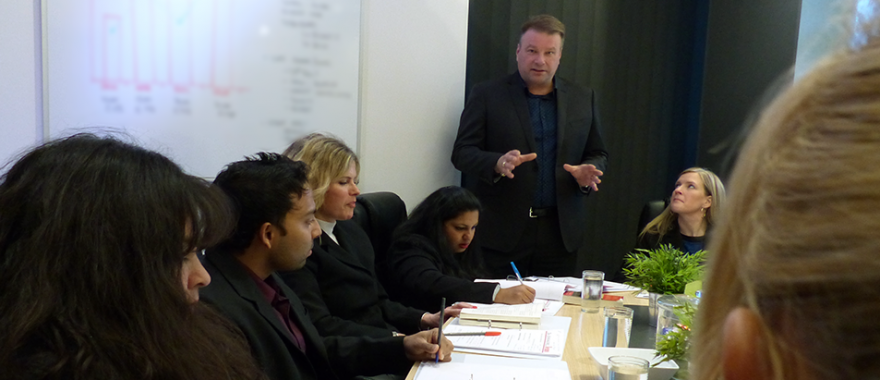By its very nature the workplace can become a place where conflict is inevitable. In any team or organisation we find a variety of different personality types and this can lead to stress and conflict. We have all experienced, or heard of, workplace horror stories such as; “The Narcicist” who does little work,spending most of his day checking out the surf report and pushing everything back onto his subordinates. Or the “The toxic ex sales manager”, who now has a sales role in the same store he once managed, through to the person who dreads coming to work because of the poor work place environment and bullying. The human impact as well as the financial costs to business in terms of days off, productivity loss and the costs of any subsequent unfair dismissal, adverse action or breach of contract claims, to name a few, are very great. Queensland Government research shows that 65% of employee performance problems are as a result of strained relationships, rather than a lack of skill or motivation.
Their research also shows that 30% of a typical managers time is spent dealing with disputes. In most workplaces there will be a range of different personality types.There seems to be a variety of ways of classifying these personality types but they usually include the following generic types; ”The leader, the nurturer, the wise owl who everybody goes to for advice, the joker, the enthusiast, the connector who knows ‘everyone’, the cynic (realist), the knit picker who is into detail, the creative and the innovator. Other personality types can include the baby who continually wines, the bully, who loves it when others are afraid, the passive aggressive, the princess, the pessimist whose glass is always half empty, the ‘yes’ man or woman, desperate to please and the non player who is totally disengaged”. With these different personalities interacting and working in close proximity, there is always fertile ground for conflict in any workplace..
As a manager there are a number of things that you can do to deescalate conflict in your teams.
1. Act early Your action or inaction has a huge influence on the outcome of this situation. Don’t assume things will improve of their own accord nor wait till the conflict has escalated to the stage where you automatically have to bring in specialists. As soon as you are aware of any potential issue act quickly and then continually monitor the situation. Find out what people are feeling and needing in nonthreatening conversations with them. Remember that when conflict arises, people can feel very strong emotions; fear, sadness, anger, or shame. Just acknowledging these feelings with your staff,can lessen their impact. Underlying these feelings may be the need for trust, respect, or recognition. Your active listening may help determine what these needs are.
2. Be empathetic and listen to both sides with an open mind. Reflective listening, restating what the speaker has said, is a great tool and allows the person speaking to feel listened to. In any conflict situation it is important that everyone understands what has been said . This will often require clarifying questions. It may be important at this point to remember to be empathetic. This doesn’t mean that you agree with everything that is said but it does require active listening. It is important to take even what you might consider minor concerns seriously. Remember people in conflict can often be very sensitive to perceived rejection. This might include someone not saying good morning or people making comments about the person’s appearance. As long as these are handled sensitively, these can be addressed in your team.
3. Adopt a future focused attitude. People in conflict can often have a negative view of the way their grievance has been handled. By asking them what they would like to see happen and encouraging them to express what they think should happen moving forward,offers them hope. In your conversations try to direct your staff to look at the future possibilities for resolution.
4. Correctly diagnose the main issues before deciding on your strategic plan. When you become aware that you have got a conflict going on in your team it is advisable to get as much background on it as possible This will allow you to assess the situation as a whole. It may be that there are team function issues or it may highlight weaknesses in management style. If there are no diagnosed mental health issues involved, no formal claim has been lodged and the parties are open to conflict resolution then your role can facilitate a resolution. Diagnosing the issue will allow you to determine the sort of dispute resolution process or combination of processes that is most appropriate. This may include mediation, team facilitation or individual coaching or training.
If you decide to hold a conflict resolution meeting make sure everyone involved knows exactly what the issue is and why they’re arguing. Allow each person to clarify their perspectives and opinions, giving equal time for them to express their thoughts. Sometimes it will be necessary to put some sort of time limit on the participants of the conflict resolution session. It’s your responsibility to make sure everyone feels safe and supported, and that no one feels ganged up on. Talk things through until you reach your first level of consensus: Everyone agrees that there’s a problem and is clear on the nature of the problem. Don’t force solutions before the situation is clear. If there are potential mental health issues and any party is unwilling to take responsibility to resolve the conflict or a formal complaint has been lodged, then you will need to protect your organisation by bringing in outside experts.
5. Build trust in your team through confidentiality and impartiality. In conflict situation,s it is vital to build trust with your team. In any meetings you have it is really important for you as a manager to be impartial with your team and don’t just support the more successful member of the team. If staff feel you prefer another team member, this can lead to that member feeling justified to continue the conflict and that can turn out badly. Some aspects of the negotiation or conversation can be very sensitive and it is really important that all parties adhere to a policy of confidentiality. Rumors and innuendo can really destroy team morale. It is also important to deal with any triangulation of communication in the conflict resolution. There is no substitute for clear and direct communication.
6. Transparency. The whole purpose of the dispute resolution process is to achieve a win win solution where everyone is satisfied and the company is the winner. Keep each of the people involved in the conflict updated about the progress in resolution. This can make staff feel that they have been listened to and that the company is concerned with their well being. This also means that you as a manager need to take accurate and effective notes on the meetings held and these need to be distributed to the affected parties. This then helps to protect all parties.
Once the conflict has been resolved it is important not to assume that it has gone away. Rather check in on your team members .Initially, depending on the situation this may be daily, weekly once a fortnight or once a month. This will help staff feel that their concerns are important to you and that they are being supported. One of the greatest ways to avoid conflict escalating is to spend some time on training in effective communication and listening skills. Team building, mentoring and other strategies can also be used to build your teams cohesian. I believe that if you act in a timely and sensitive way, resolution can be found where there is a sincere desire to do so.
Within every conflict in the work place there is a tremendous opportunity for teaching and learning. Where there is disagreement view this as a potential for growth. Divergent positions addressed properly can stimulate your team to greater innovation and creativity. It can also strengthen the relationships in your team and this leads to greater productivity affecting your companies bottom line profit.
By David Bromilow
MD National Talent Partners
Securing and developing talented people for sucessful businesses.




